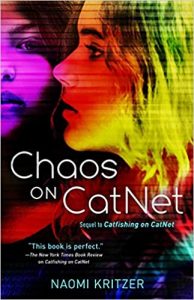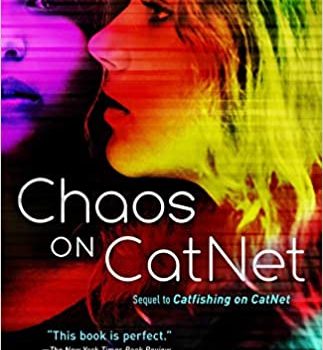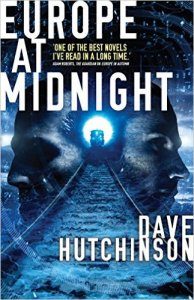Gary K. Wolfe Reviews Chaos on Catnet by Naomi Kritzer
 Chaos on Catnet, Naomi Kritzer (Tor Teen 978-1-25016-522-0, $18.99, 304pp, hc) April 2021.
Chaos on Catnet, Naomi Kritzer (Tor Teen 978-1-25016-522-0, $18.99, 304pp, hc) April 2021.
Naomi Kritzer’s Chaos on Catnet is a direct sequel to her Lodestar Award winner Catfishing on Catnet, and it does exactly what a sequel should do: expand the stakes, introduce a few important new characters, reveal some secrets and puzzles left over from the first novel, and deepen the tone a bit. The trick is to manage all this without retreading familiar plot points or losing the authentically breezy YA tone of the first novel. Catfishing on Catnet managed to keep that almost sunny tone intact while developing some pretty dark plotlines: the teenage Steph and her computer-genius mom moved from town to town in an effort to avoid being tracked down by her abusive and even homicidal father, never settling anywhere for long and never giving Steph a chance to develop friendships. Her social life took place almost entirely with a group of mostly geeky friends on a website called Catnet, which is actually managed by one of those friends, who (we learn) turns out to be a powerful AI calling itself CheshireCat, and who basically just wants to look at cat pictures and help out her new friends. Chaos on Catnet begins with Steph’s father safely behind bars, and Steph and her mom finally settling into a more stable life in Minneapolis. But while the first novel featured a really scary father, this one features not one but two really scary mothers, a mad scientist programmer, a whole passel of doomsday cultists, and a rogue AI which seems to waffle between just wanting to look at flower pictures and trying to turn itself into Skynet. Fortunately, it also introduces a kick-ass grandma.
We could see that rogue AI coming at the end of Catfishing on Catnet, when CheshireCat received an anonymous and untraceable message saying “I know who and what you are. Do you know me?” That novel divided its first-person narratives between Steph and CheshireCat, interspersed with occasional discussions among Steph’s “clowder” on Catnet. Chaos introduces a third narrator, Nell, a new schoolmate of Steph’s whose cult-member mother has disappeared and who now finds herself living in her long-alienated father’s polyamorous household, which includes his wife, her girlfriend, and his girlfriend. This is obviously appalling to Nell’s more or less fundamentalist Christianity, and sets up one of the challenges Kritzer sets for herself: creating a credible voice for the conflicted Nell, who shares her mother’s religiosity but has a girlfriend of her own, Glenys. She’s not nearly as savvy or quick-witted as Steph and her Clowder friends (though she’s sarcastic enough to refer to the adult women in the home as Thing One and Thing Two). When Glenys disappears, Nell needs to learn some degree of trust for people she has been trained to view as evil.
But there is more to the cult than even its creepy belief in deprogramming gays, and it may involve that rogue AI. A Pokémon GO-style website called the Mischief Elves sends its members on odd assignments gathering things, while the social media site used by the cult seems to be organizing something far more ominous and more violent, if a bit more far-fetched. This leads to Kritzer’s second major challenge, and one she openly acknowledges in a brief afterword: setting a near-future novel involving urban violence and terrorism in a changing, post-George Floyd Minneapolis, a city described in such convincing detail that is almost seems like another character facing hard life choices. The choices Kritzer makes, like those of her characters, are essentially optimistic, and it’s that resilient optimism – ranging from the possibilities of law enforcement reform to the power of friendship, even to the awesome potential of free-will AIs – that makes Chaos on Catnet as appealing and empowering as its predecessor.
Gary K. Wolfe is Emeritus Professor of Humanities at Roosevelt University and a reviewer for Locus magazine since 1991. His reviews have been collected in Soundings (BSFA Award 2006; Hugo nominee), Bearings (Hugo nominee 2011), and Sightings (2011), and his Evaporating Genres: Essays on Fantastic Literature (Wesleyan) received the Locus Award in 2012. Earlier books include The Known and the Unknown: The Iconography of Science Fiction (Eaton Award, 1981), Harlan Ellison: The Edge of Forever (with Ellen Weil, 2002), and David Lindsay (1982). For the Library of America, he edited American Science Fiction: Nine Classic Novels of the 1950s in 2012, with a similar set for the 1960s forthcoming. He has received the Pilgrim Award from the Science Fiction Research Association, the Distinguished Scholarship Award from the International Association for the Fantastic in the Arts, and a Special World Fantasy Award for criticism. His 24-lecture series How Great Science Fiction Works appeared from The Great Courses in 2016. He has received six Hugo nominations, two for his reviews collections and four for The Coode Street Podcast, which he has co-hosted with Jonathan Strahan for more than 300 episodes. He lives in Chicago.
This review and more like it in the April 2021 issue of Locus.
 While you are here, please take a moment to support Locus with a one-time or recurring donation. We rely on reader donations to keep the magazine and site going, and would like to keep the site paywall free, but WE NEED YOUR FINANCIAL SUPPORT to continue quality coverage of the science fiction and fantasy field.
While you are here, please take a moment to support Locus with a one-time or recurring donation. We rely on reader donations to keep the magazine and site going, and would like to keep the site paywall free, but WE NEED YOUR FINANCIAL SUPPORT to continue quality coverage of the science fiction and fantasy field.
©Locus Magazine. Copyrighted material may not be republished without permission of LSFF.








